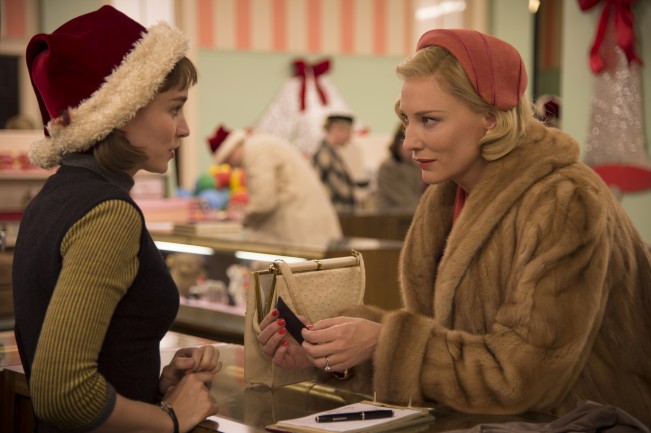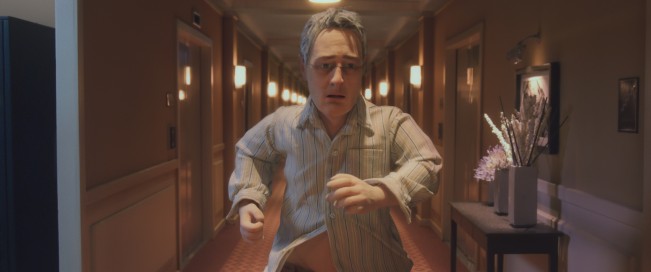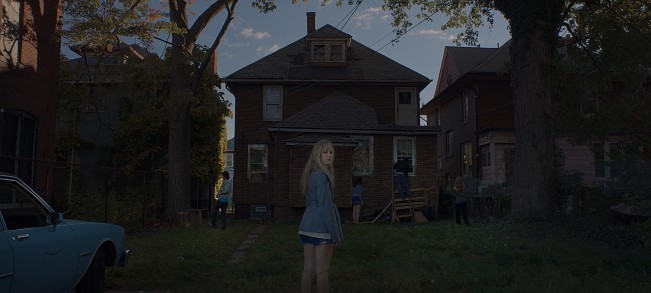Movie City Indie Archive for December, 2015
Haskell Wexler On The Days Of Heaven Camera Credit (2013) (1’19”)
Thirty Favored Features For 2015 (And Twenty More)

1. Carol (Todd Haynes) Haynes may have crafted his best feature, merging intelligence and emotion in a rich, immersive canvas. A society woman in an unsatisfying marriage, Cate Blanchett’s Carol is matched for emotional perplexity by Therese, Rooney Mara’s younger shop clerk and photographer manqué. What does it mean when the two of us are in the same room, they venture in a succession of gestures, ventures and setbacks. Hayne’s lapidary precision embraces the fall, the fear, the luxuriant allure of longing and maybe lasting love.
2. Anomalisa (Charlie Kaufman, Duke Johnson) All too human.
 3. Taxi (Jafar Panahi) A film about films and filmmaking and a filmmaker barred from making films by a filmmaker who worships films and is barred from making films, Jafar Panahi’s blissfully kind, effortlessly wise third feature since being sentenced to silence by the Iranian regime is an elegant, minor-key masterpiece. [More.]
3. Taxi (Jafar Panahi) A film about films and filmmaking and a filmmaker barred from making films by a filmmaker who worships films and is barred from making films, Jafar Panahi’s blissfully kind, effortlessly wise third feature since being sentenced to silence by the Iranian regime is an elegant, minor-key masterpiece. [More.]
4. It Follows (David Robert Mitchell) “Your disease… it’s inside me,” to appropriately appropriate words from David Lynch.
5. The Mend (John Magary) Magary’s directorial debut is dauntingly, tumultuously, blindingly, batshit great. In modern-day New York, a figure arrives in our consciousness, after the shattering shards of a hopeless, hapless shrieking match of a breakup. He has had a drunk or a few. Then we find him, Mat (career-best Josh Lucas), on a couch, at a party, he’s all-but-homeless, a couch surfer, someone’s brother, kind of a ruffian, certainly a hairball. And a talker. He does not chat. He holds forth. He’s an American parallel to the bleak wisecracker named Johnny at the center of Mike Leigh’s apocalyptic/post-apocalyptic Naked, beyond offensive, from bullshit beyond shibboleths, articulating misery or misgivings to everyone reluctantly around him, repellently magnetic. (Netflix Instant.) [More.] Read the full article »
Fifteen Feature Documentaries For 2015

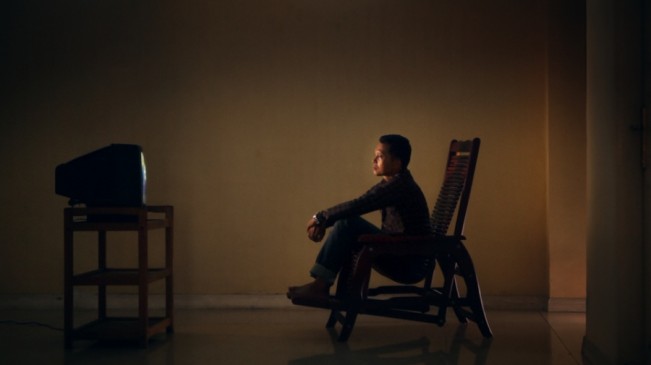 1. The Look Of Silence (Joshua Oppenheimer) While promoting The Act Of Killing, his punchy, audacious, madly performative, deeply troubling masterpiece about the legacy fifty years after the genocide in Indonesia of political opponents, Joshua Oppenheimer didn’t much let on that there was a second, complementary feature in the works. While editing the first film, before his secondary subjects in the government and paramilitaries, knew what a bold, damning document he had fashioned, Oppenheimer shot a round of elegant, formally restrained interviews with his earlier subjects through the offices of his collaborator, Adi Ruken, an optometrist whose older brother had been murdered. Among a range of substantial achievements, Oppenheimer formally anticipated the critique some purists would lodge—veteran documentary commissioner Nick Fraser among them—and embodying Godard’s dictum that the only true criticism of a film would be to make another film, even if it is self-critique. The Look Of Silence responds lucidly to those who found revulsion rather than revelation in his depiction of the gaudy cinema-fashioned fantasies of petty gangsters who still terrorized their neighbors decades later. Of his film about the eddying damage visited upon the victims, he’s talked about the impunity under which he and Adi were able to challenge the still-proud killers, from a strikingly different angle than their earlier interviews; what differentiates the “authentic” from the “typical” in documentary; how The Look Of Silence is like a poem as well as the films of Ozu; and how the metaphor of willful moral blindness and literal myopia, as demonstrated through eye exams performed by Adi while he gently prompts their subjects to once more describe their worst exploits, became a powerful and mysterious metaphor even though it began as a pragmatic choice to maintain their safety in the face of unapologetic murderers. [The link is to my Filmmaker cover story interview with Oppenheimer, which is behind the subscriber paywall.]
1. The Look Of Silence (Joshua Oppenheimer) While promoting The Act Of Killing, his punchy, audacious, madly performative, deeply troubling masterpiece about the legacy fifty years after the genocide in Indonesia of political opponents, Joshua Oppenheimer didn’t much let on that there was a second, complementary feature in the works. While editing the first film, before his secondary subjects in the government and paramilitaries, knew what a bold, damning document he had fashioned, Oppenheimer shot a round of elegant, formally restrained interviews with his earlier subjects through the offices of his collaborator, Adi Ruken, an optometrist whose older brother had been murdered. Among a range of substantial achievements, Oppenheimer formally anticipated the critique some purists would lodge—veteran documentary commissioner Nick Fraser among them—and embodying Godard’s dictum that the only true criticism of a film would be to make another film, even if it is self-critique. The Look Of Silence responds lucidly to those who found revulsion rather than revelation in his depiction of the gaudy cinema-fashioned fantasies of petty gangsters who still terrorized their neighbors decades later. Of his film about the eddying damage visited upon the victims, he’s talked about the impunity under which he and Adi were able to challenge the still-proud killers, from a strikingly different angle than their earlier interviews; what differentiates the “authentic” from the “typical” in documentary; how The Look Of Silence is like a poem as well as the films of Ozu; and how the metaphor of willful moral blindness and literal myopia, as demonstrated through eye exams performed by Adi while he gently prompts their subjects to once more describe their worst exploits, became a powerful and mysterious metaphor even though it began as a pragmatic choice to maintain their safety in the face of unapologetic murderers. [The link is to my Filmmaker cover story interview with Oppenheimer, which is behind the subscriber paywall.]

2. Amy (Asif Kapadia) Kapadia’s enveloping, harrowing, even revelatory second documentary with a posthumous subject is a musical, a tragedy, and a major mash-note to the too-soon-gone talent of Amy Winehouse. “Amy” also portrays a woman who was not so much an addict as someone consumed by feelings, the need to express them, and by brutally intense sensations of love. [More.]
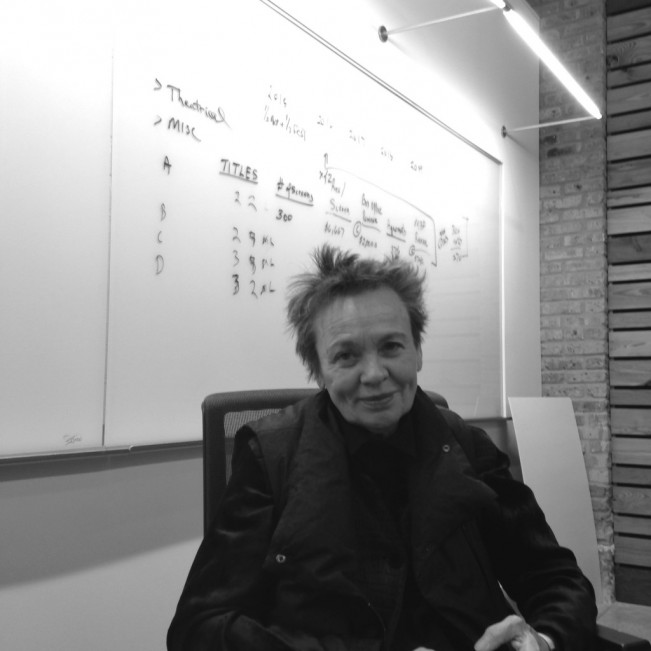 3. Heart of a Dog (Laurie Anderson) “Hello, little bonehead. I’ll love you forever.” Laurie Anderson’s “Heart of a Dog” opens with the identifiable twinkling cadences of her voice, a wonder-struck performative instrument. She’s saying goodbye to someone she loved: her rat terrier Lolabelle. It’s a winsome, plainspoken, concrete, elusive wonder of an essay film about loss and grief. Lolabelle is the second lead, after the murmurs and venturing of her voice, but that’s not all. Someone named Lou is at the heart of it, even when his presence is only in our consciousness. Heart of a Dog invokes Buddhism and 9/11 and living in Manhattan afterwards and the modern surveillance state and many matters both earthbound and otherworldly, and it’s also a stream of consciousness that literally invokes water and rain and snow and bodies of water, writing atop writing, layerings of images, a palimpsest of inscribing atop inscriptions, as well as splendid sound, overlapping strands of music of polyphonic charm, as well as her voice, always her voice, insistent as ragged memory. [More.] [Portrait © Ray Pride.] Read the full article »
3. Heart of a Dog (Laurie Anderson) “Hello, little bonehead. I’ll love you forever.” Laurie Anderson’s “Heart of a Dog” opens with the identifiable twinkling cadences of her voice, a wonder-struck performative instrument. She’s saying goodbye to someone she loved: her rat terrier Lolabelle. It’s a winsome, plainspoken, concrete, elusive wonder of an essay film about loss and grief. Lolabelle is the second lead, after the murmurs and venturing of her voice, but that’s not all. Someone named Lou is at the heart of it, even when his presence is only in our consciousness. Heart of a Dog invokes Buddhism and 9/11 and living in Manhattan afterwards and the modern surveillance state and many matters both earthbound and otherworldly, and it’s also a stream of consciousness that literally invokes water and rain and snow and bodies of water, writing atop writing, layerings of images, a palimpsest of inscribing atop inscriptions, as well as splendid sound, overlapping strands of music of polyphonic charm, as well as her voice, always her voice, insistent as ragged memory. [More.] [Portrait © Ray Pride.] Read the full article »





